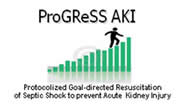Background
Severe sepsis is a condition which causes organ functions to be impaired due to infection in the body. The number of Americans dying with sepsis is similar to that of acute myocardial infarction (heart attack). Sepsis affects 750,000 Americans each year with a death rate of 30%. Doctors have a good understanding of the abnormalities that occur with sepsis, but the ability to improve outcomes for patients is difficult. One such organ that becomes impaired is the kidney. In order to establish new therapies for the management of sepsis and sepsis-induced kidney injury and impairment, all subjects currently enrolled in the study Protocolized Care for Early Septic Shock (ProCESS) will be asked to participate in the study Protocolized Goal-directed Resuscitation of Septic Shock to Prevent Acute Kidney Injury (ProGReSS AKI). This long term follow-up study will look at the development, recovery, prevention, and treatment results of acute kidney injury (AKI).
Doctors draw from a list of signs and symptoms in order to make a diagnosis of sepsis such as: abnormalities of body temperature, heart rate, respiratory rate, and white blood cell count. Sepsis can be diagnosed in people with pneumonia, appendicitis or other severe infections. Sepsis is defined as severe when these findings occur in association with signs of organ dysfunction (including acute kidney injury) confirmed by blood test results. Basic treatments like fluids are often neglected but are potentially important for the prevention of acute kidney injury. Patients who developed clinical signs of infection, and were given a diagnosis of sepsis were enrolled in the ProCESS study. While several in-hospital assessments are currently being collected within ProCESS, the ProGReSS AKI study will follow ProCESS subjects after hospital discharge to better understand the long-term effects of sepsis particularly on the kidney and heart. ProGReSS AKI will focus on two important complications: recovery of renal (kidney) function and cardiovascular (heart) consequences of sepsis.
In order to study the risk factors for and consequences of AKI in patients with sepsis, two groups will be followed: those with AKI, and those without. ProGReSS AKI will follow ProCESS subjects who have been discharged from the hospital; these subjects will be contacted and asked to participate in ProGReSS AKI. This study will include in-home study visits. Subjects will be followed for three years at four separate visits (Months 3, 6, 12 and 36) in order to study the course of AKI and sepsis and to learn whether the treatments given in ProCESS were helpful in mitigating long term health risks.
|

